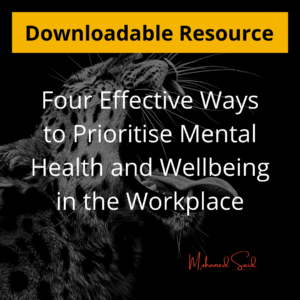Given the complexity of a business leader’s countless responsibilities, there is no doubt that mental health and wellbeing are important considerations. Business leaders are prime influencers of management, business culture as well as employee experiences. That being so, their mental health as well as that of all members of the organisation need to be prioritised and taken care of.
The mental health of all individuals within an organisation is critical because it affects decision-making processes, performance and outcomes. Sound mental health will help employees and executives thrive even amidst crises and sudden challenges.
Here are four strategies that organisations can employ to promote mental health and wellbeing at work.
1. Set Up Flexible Work Policies
Flexible work arrangements are one of the best ways to accommodate to the needs of workers with mental illness. These can be introduced by carefully considering the job requirements along with employee circumstances, then adapting the working hours, tasks, responsibilities, location or break frequency and duration accordingly.
Doing so is likely to foster productivity that extends from the professional to personal areas of life.
As an effect, employees will be healthier, more motivated and more engaged. This, in turn, serves to attract and retain quality talent in the organisation.
2. Impart Trust
Creating a foundation of trust within your organisation is exceedingly important to overall success and wellbeing. When a prevalent environment of trust is established within an organisation and feelings of inhibition and discomfort are reduced among staff, the following occurs:
- Higher team morale and motivation
- Enhanced performance and productivity
- Increased collaboration
- Increased innovation and creativity
- Improved mental health

3. Empower Employees
Empowered employees are those who have their own voices in the organisation. They can be heard, share their thoughts, and openly contribute to decision-making. Most importantly, they are made to feel like they truly BELONG in the organisation.
Business leaders who promote employee autonomy successively empower staff to attain their goals and objectives. In doing this, business leaders cultivate mental wellbeing in employees while minimising feelings of powerlessness — they listen, engage and trust their employees.
4. Create Wellness Programs
To cultivate good mental health in an organisation, business leaders must organise and run wellness programs, workshops and training sessions aimed at nurturing the mind-body connection of all organisational actors.
In times of crisis, states of stress, anxiety and depression are not uncommon. Therefore, nurturing mental health will prepare employees to be resilient when faced with unexpected stressors.
Mental illness can be a temporary condition, but it can have a huge impact on one’s personal and professional life.
In building a successful and sustainable business, one of the most vital roles of a leader is to cultivate good mental health among every member of the organisation.

